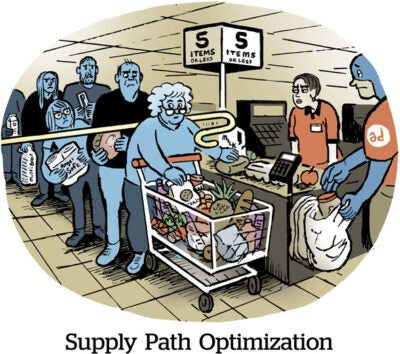 The Trade Desk reported earnings of $377 million in Q2 this year, up by a little more than a third compared to the same period in 2021.
The Trade Desk reported earnings of $377 million in Q2 this year, up by a little more than a third compared to the same period in 2021.
The company did dip from recording a $48 million profit in Q2 2021 to a $19 million loss this quarter, though that’s because founder and CEO Jeff Green collected a $66 million stock-based incentive bonus this quarter. The payout increased The Trade Desk’s general and administrative costs from $12.5 million in Q2 2021 to $80.9 million this year.
The Trade Desk stock jumped by about 15% after trading closed.
Green said there are macro-economic headwinds. “But it possible to have macro-headwinds in our face and secular tailwinds that overshadow that,” he said.
The Trade Desk has been hammering the same messages about tailwinds in quarterly earnings calls the past couple years: hyping the CTV business first and foremost, along with the retail media segment and a dash of Google-bashing for good measure.
The company’s investor call on Tuesday adhered to the trend.
Just connected
Despite hyping the rise of CTV, The Trade Desk doesn’t disclose its CTV revenue – or break out revenue by channel or device in general. The closest the company came to revealing CTV’s contribution was by revealing that video ads (which includes desktop, mobile and TVs) are in the 40% range of overall revenue, and the segment is“growing fast as a percentage of our overall mix,” according to CFO Blake Grayson.
Green leaned hard on Disney as an example of a standout film and TV entertainment company seizing the programmatic opportunity. Disney became the largest media player to integrate with the Unified ID 2.0 identity program, and The Trade Desk is a pilot partner for Disney’s data clean room product development.
But the Trade Desk’s biggest CTV win didn’t involve The Trade Desk directly.
“I for one was very excited when I heard Netflix selected Microsoft,” Green said.
Ad tech circles are small, and Green said he felt personally gratified, since he had introduced the then-president of Microsoft Advertising to Brian O’Kelley, the then-CEO of AppNexus way back when, after Microsoft had acquired Green’s early programmatic exchange startup AdECN. The introduction blossomed into a major strategic partnership and eventually led to Microsoft acquiring AppNexus, now called Xandr.
But for the Trade Desk, which is trying to grow its CTV business, the move indicates that Netflix intends to source demand from a broader set of companies and serve ads to the open web. Enter The Trade Desk.
Xandr focuses on its SSP, and although it does have a DSP, Green estimated that it accounts for less than 10% of The Trade Desk’s CTV demand.
If Microsoft had gone with Google, the early Vegas favorite to win the Netflix account, or another full-stack vendor, it would indicate the company was pursuing a walled garden model. The decision to go with Microsoft “is another sign that savvy companies understand the opportunity of the open internet compared to the limitations of walled gardens,” Green said.
CTV is also a big opportunity for The Trade Desk because “in relative terms, the market is fair,” he said. Despite the fact that programmatic is still given scraps while networks sell off the juiciest inventory during the upfronts, there’s no one dominant tech provider underneath.
No individual company in CTV “has the position to be Draconian,” Green said. In contrast, Google’s control of search, web browser and ad server market share mean it’s like a football player who gets to whistle plays dead and make up rules on the fly.
Going for Google
One of the “macro-worldwide trends” that benefit The Trade Desk the most is the regulatory pressure on Google.
When governments and regulators bring cases against Google, Green said The Trade Desk sees tangible gains in those markets. Agencies move more of their business toward options like its DSP.
Google’s policies and actions have made it very difficult for companies (“that are smaller than The Trade Desk”) to sustainably monetize the open web, Green said. He also cited the UK antitrust commissioner’s investigation into Google for allegedly favoring its own service to the detriment of rivals, potentially causing higher prices on goods and services to be passed on to consumers because of the higher cost of ads for businesses.
Here to shop
Retail media is a more recent addition to The Trade Desk’s earnings report.
In Q2, The Trade Desk announced ad-buying and identity partnerships with Walgreens, Target and Albertson’s, among other retail chains. Not to mention The Trade Desk’s DSP setup with Walmart, which documented its first full quarter underway.
These retailers are investing heavily in their shopper ad platforms because the platforms are factoring into larger business decisions about profitability, such as managing worker hours or and increasing online orders for in-store pickups, which have a much higher profit margin than home delivery, rather than just collecting some low-hanging fruit from site display ads.
Retail media doesn’t bring the same mass inventory influx, like mobile, CTV or display. But retail media partnerships dramatically increase the company’s total addressable market, Green said.
Less and less of the web is addressable. A much smaller share of mobile ads can be targeted by a device or advertising ID. Retail media doesn’t bring much inventory, but it brings user-level data, and otherwise non-addressable media turns into potentially user-targeted spots.
“Initially, retailers looked at retail media a saw a way to make more money,” Green said. “Now they look at it as a way to spin their flywheels faster.”







 By
By 


